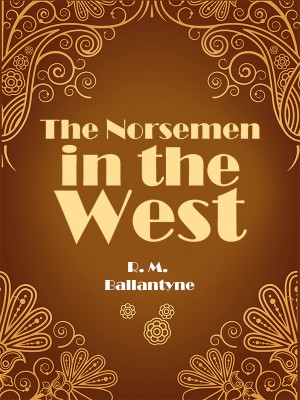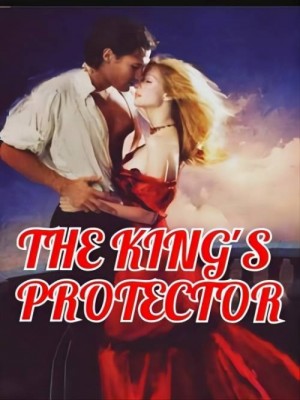
The Norsemen in the West
One fine autumn evening, between eight and nine hundred years ago, two large hairy creatures, bearing some resemblance to polar bears, might have been seen creeping slowly, and with much caution, toward the summit...
One fine autumn evening, between eight and nine hundred years ago, twolarge hairy creatures, bearing some resemblance to polar bears, mighthave been seen creeping slowly, and with much caution, toward the summitof a ridge that formed a spur to one of the ice-clad mountains ofGreenland. The creatures went on all-fours. They had long bodies,short legs, shorter tails, and large round heads.
Having gained the top of the ridge they peeped over and beheld a hamletnestled at the foot of a frowning cliff; and at the head of a smilinginlet. We use these terms advisedly, because the cliff, being in deepshadow, looked unusually black and forbidding, while the inlet, besidesbeing under the influence of a profound calm, was lit up on all itsdimples by the rays of the setting sun.
The hamlet consisted of one large cottage and half a dozen small cots,besides several sheds and enclosures wherein were a few sleepy-lookingsheep, some lean cattle, and several half-starved horses. There wasactive life there also. Smoke issued from the chimneys; fresh-lookingwomen busied themselves about household work; rosy children tumbled inand out at the doors, while men in rough garments and with ruddycountenances mended nets or repaired boats on the shore. On a bench infront of the principal cottage sat a sturdy man, scarcely middle-aged,with shaggy fair and flowing locks. His right foot served as a horse toa rapturous little boy, whose locks and looks were so like to those ofthe man that their kinship was obvious--only the man was rugged andrough in exterior; the boy was round and smooth. Tow typified the hairof the man; floss silk that of the boy.
Everything in and around the hamlet bore evidence of peace and thrift.It was a settlement of Norsemen--the _first_ Greenland settlement,established by Eric the Red of Iceland about the year 986--nearly twentyyears before the date of the opening of our tale--and the hairycreatures above referred to had gone there to look at it.
Having gazed very intently over the ridge for a considerable time, theycrept backwards with extreme caution, and, on getting sufficiently fardown the hill-side to be safe from observation, rose on their hind-legsand began to talk; from which circumstance it may be concluded that theywere human beings. After talking, grinning, and glaring at each otherfor a few minutes, with gestures to correspond, as though on the pointof engaging in mortal combat, they suddenly wheeled about and walked offat a rapid pace in the direction of a gorge in the mountains, the headof which was shut in by and filled up with cliffs and masses and fieldsof ice that overtopped the everlasting hills, and rested like a whitecrest on the blue sky. Vast though it seemed, this was merely a tongueof those great glaciers of the mysterious North which have done, and arestill doing, so much to modify the earth's economy and puzzleantiquarian philosophy; which form the fountain-head of influences thatpromote the circulation of the great deep, and constitute the cradle ofthose ponderous icebergs that cover the arctic seas.
From out that gloomy gorge a band of more than a hundred hairy creaturesissued with wild shouts and upraised arms to welcome back theadventurous two. They surrounded them, and forthwith the nation--forthe entire nation was evidently there--held a general assembly orparliament on the spot. There was a good deal of uproar and confusionin that parliament, with occasional attempts on the part of severalspeakers to obtain a hearing at one and the same time--in which respectsthis parliament bore some resemblance to civilised assemblies of thepresent day. There was also an immense amount of gesticulation andexcitement.
At last there uprose a man clad in garments that had once belonged to aseal, and with a face that was quite as round and nearly as flat as afrying-pan. He stood fully half a foot higher than the tallest of hisfellows. Like the adventurous two he had a tail--a very short tail--tohis coat; but indeed this might be said of all the men of the tribe.The women's tails, however, were long. Perhaps this was meant as a markof distinction, for their costume was so very similar to that of the menthat their smaller size and longer tails alone marked the difference.To be sure there was additional presumptive evidence of their sex in thefact that most of them carried babies in their hoods; which hoods weremade preposterously large for the express purpose of containing thebabies.
To the tall man with the flat face the assembly listened with eagerlooks, bated breath, and open mouths. What he said--who can tell? Hislanguage was unintelligible to civilised ears. Not so, however, hisactions, which were vigorous and full of meaning, and comprehensible byall nations. If there be any significance in signs at all he began bysaying, "Hold your stupid tongues and _I_ will speak." This drew forthloud and prolonged applause--as consummate impudence usually does. Whenhe pointed with both hands to the women and children, and spoke intender tones, instantly thereafter growling in his speech, gnashing histeeth, glaring fiercely, waving one hand at the surrounding hills andshaking the other, clenched, at the unoffending sea--he was obviouslystating his grievances, namely, that the white men had come there towrest from him his native hills and glaciers, and rob him of his wifeand children, and that he defied them to come on and do their worst,seeing that, in regard to the whole assembled white world in arms he didnot care a button--or a walrus-tusk, for buttons were unknown to thesecreatures at that time. When, suddenly changing his manner and tone, heseized a spear, hissed his sentiments through his teeth with greatvolubility, and made a furious plunge that caused the assembly to gasp,and the man nearest the spear point to shrivel up--what _could_ be hismeaning save that nothing short of a hole right through the body of aNorseman could appease the spirit of indignation that caused his bloodto boil? And when, finally, he pointed to the setting sun, traced aline with his finger from it downward to the centre of the earth underhis feet, then shook his spear wrathfully toward the sea and wound upwith a tremendous Ho! that would have startled the echoes of the placehad there been any there, it was plain to the meanest capacity that anattack--impetuous and overwhelming--was to be made on the strangers atmidnight.
Whatever were his sentiments, the assembly heartily appreciated,applauded, and approved them. They cheered and shouted "Hear, hear,"after their own fashion, and then the whole band rushed back into themountain gorge,--doubtless with the intent to gorge themselves with rawblubber, prepare their weapons, and snatch a little repose beforeissuing forth to battle.
But let us return to the Norsemen, over whose innocent heads such awfulprospects were impending.
The sturdy man with the fair shaggy locks was Leif, the son of Eric theRed of Iceland. The boy with the silken curls, who rode on his foot sojoyously, was his son Olaf.
Eric had died several years before the date on which our tale opens, andLeif inherited his cottage and property at Brattalid in Ericsfiord, onthe west coast of Greenland--the hamlet which we have already described.
"Come now, Olaf," said Leif, flinging the child from his foot to hisknee, and thence to the ground, "give me your hand; we shall go see howthe boats and nets get on.--Hey! there goes a puff of wind. We shallhave more presently." He paused and scanned the seaward horizon withthat intent abstracted gaze which is peculiar to seafaring men. So longdid he gaze, and so earnestly, that the child looked up in his face withan expression of surprise, and then at the horizon, where a dark blueline indicated the approach of a breeze.
"What do you see, father?" asked Olaf.
"Methinks I see two ships," replied Leif.
At this there came a sweet musical voice from the cottage:--"Ships,brother! Did I not tell you that I had a dream about two ships, andsaid I not that I was sure something was going to happen?"
The speaker appeared in the doorway, drying her hands and arms on atowel,--for she had been washing dishes. She was a fair comely youngwoman, with exceedingly deep blue eyes, and a bright colour in hercheeks,--for women of the richer class were remarkably healthy andwell-made in those days. They did a great deal of hard work with theirhands, hence their arms were strong and well developed without losinganything of their elegance.
"You are always dreaming, widow Gudrid," said Leif, with a quietsmile,--for he was no believer in dreams or superstitions, in whichrespect he differed much from the men and women of his time;"nevertheless, I am bound to admit that you did tell me that `something'was going to happen, and no one can deny that something _is_ about tooccur just now. But your dream happened a month or six weeks ago, andthe `something,' which you are pleased to assume is these two ships, isonly happening to-day. See, now, I can be a more definite prophet thanthou: I will prophesy that Yule is coming,--and it will surely come ifyou only wait long enough!"
"You are an unbeliever, brother-in-law," retorted Gudrid, with a laugh;"but I have not time to reason with you. These ships will bringstrangers, and I must prepare to show them hospitality.--Come, Olaf,help me to put the house in order."
Thus summoned, Olaf followed Gudrid into the house with alacrity, for hewas passionately fond of his pretty aunt, who stood in the place of amother to him, his own mother having died when he was an infant.
"But, aunt," said Olaf, checking himself in the doorway and lookingwistfully back, "I want to see the ships come in."
"You shall see that, my son; I will not keep you too long."
This was quite sufficient. Olaf thoroughly believed in his aunt'struthfulness and wisdom. He set to work to assist in clearing away theconfusion--part of which, in the shape of toys and chips--was of his owncreating--and became so busy that he almost forgot the ships--at leastif he did remember them they did not weigh heavily on his mind.
"Now, Olaf," said Gudrid, going to the window when the preparations werenearly completed, "you may run down to the shore, for the ships willsoon be on the strand."
The boy waited no second bidding, you may be sure. He flew out of thehouse, and to his great surprise beheld the two ships--which so latelyhad appeared like sea-birds on the horizon--coming grandly up the fiord,their great square sails bulging out before a smart breeze.
All the men of the little colony were assembled on the shore--all, atleast, who chanced to be at home at the time; but many of theinhabitants were absent--some fishing, some gone to Iceland, and otherson viking-cruise. There were probably about thirty men on the sands,besides a good many women and children.
It must not be supposed, however, that this was the whole of thatGreenland colony. It was only the part of it that had settled atBrattalid in Ericsfiord. There was another portion, a few milesdistant, named Heriulfness, nearly as large as that of Ericsfiord, whichhad been founded by Heriulf a friend and companion of Eric the Red.Heriulf had soon followed his friend Eric to the grave, leaving themanagement of the colony of Heriulfness to his son Biarne.
Biarne had not been present when the two sails were first observed, buthe chanced to come over to Brattalid just before their arrival.
"What, ho! Biarne," shouted Leif, as the son of Heriulf went down tothe beach, "come up hither."
Leif stood on an elevated rock apart, and Biarne, a good deal excited,went up to him.
"Why, what ails thee?" asked Leif.
"Nothing," replied Biarne, "but I think I know whose ship that first oneis."
"Ay! is it the ship of a friend or a foe?"
"A friend," replied Biarne--"at least he was a friend when I knew him inNorway, nigh twenty summers past, and I did not think him changeable.You and I, Leif, have often sailed these northern seas together andapart, but I do not think that in all our wanderings either of us hasmet before or since a finer man than Karlsefin, though he was a merestripling when I knew him."
The Norseman's eyes flashed as he spoke of his friend, for, besidesbeing a strong and handsome man, he possessed a warm enthusiastic heart.Indeed, he had been noted in the settlement for the strength of hisaffection for his father Heriulf, and his dutiful conduct towards him aslong as the old man lived.
"Karlsefin," repeated Leif, musing; "I know him not."
"Yet he knows you," said Biarne; "when I met him in Norway I told himall about your discovery of Vinland."
"Nay, thine own discovery of it," said Leif.
"Not so," replied the other, with a blush, in which a frown mingled; "Idid but look upon the land--you went ashore and took possession."
"Well, if I did so I have not retained it," replied Leif, with a laugh;"but say, how know you that this is Karlsefin's ship?"
"I know by the cut of her figure-head and the colour of her sails.Karlsefin was always partial to stripes of white and blue."
"Well, it may be as you say; we shall soon know." Thus saying, Leifdescended to the beach as the vessels approached and ran their keelsstraight on the sandy shores of the bay. There was great bustle onboard, and there were many men, besides some women, who could be seenlooking over the bulwarks with keen interest, while Leif's men broughtplanks with which to make a gangway from the ship to the shore.
The ships which had thus come to Greenland were of the quaint buildpeculiar to the Norse vessels of those days--a peculiarity of build, bythe way, which has not altogether disappeared, for to this day the greatcentral mast, huge square sail, and high prow may be seen in the fiordsof Norway.
Each of the vessels which now lay beached in Ericsfiord had a highforecastle and poop, with figure-heads on stem and stern-posts thattowered higher still. The ships were only half-decked, with benches fornumerous rowers, and each had a crew of sixty men.
When the gangway was laid to the leading ship the first man whodescended to the shore was of striking appearance. It was not so muchthat he was tall and strong enough to have been a worthy foeman to thestoutest colonist in Ericsfiord, as that his demeanour was bland andcourtly, while there was great intellectuality in his dark handsomecountenance. Unlike most Norsemen, his hair and beard were black andclose-curling, and his costume, though simple, was rich in quality.
The moment he landed, Biarne stepped forward, exclaiming, "Karlsefin!"
The stranger's face lighted up with surprise and pleasure.
"Biarne!" he said, seizing his hand, "I thought you were in Iceland."
"So I was, but now I am in Greenland, and right glad to be the first towelcome my friend."
Hereupon the two shook hands fervently; but, not content with this, theyseized each other in an embrace, and their bearded mouths met with ahearty masculine smack that did credit to their hearts, and which itmight have gratified the feelings of an affectionate walrus to behold.
You may also like

The King's Protector
Eve Cheney

Just Got Lucky
Ellyreiv

Strange Love
Jacqui



